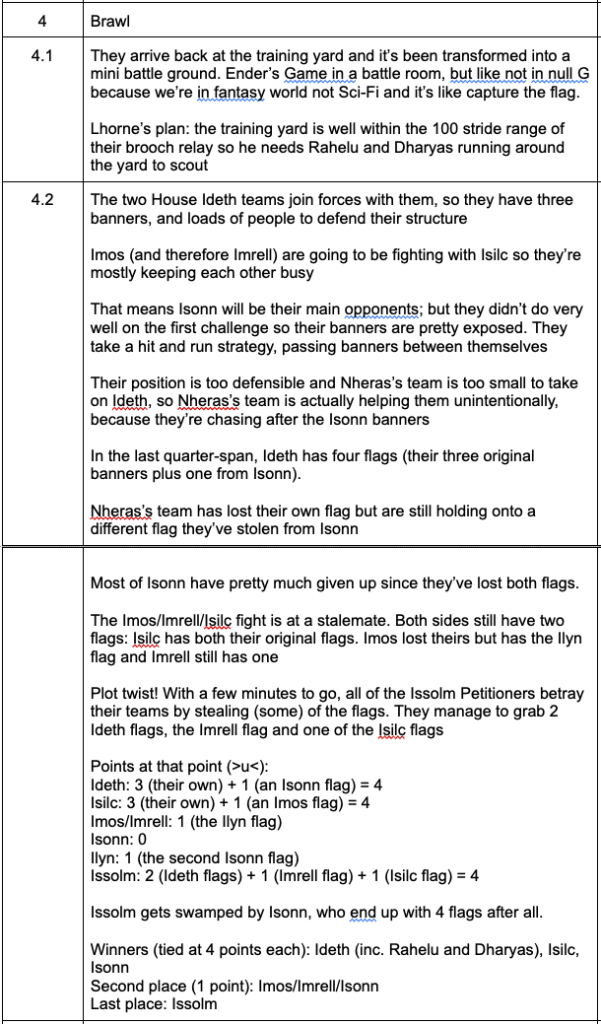Chapter 9 is the third-longest chapter in the entire book at around 6,700 words. (The longest chapter, if you’re curious, is Chapter 22 which has the action climax of the book. The second-longest is Chapter 21 which is the emotional build-up.)
I remember being incredibly nervous while writing the first draft because this is the first, big action sequence.
Unlike Fonda Lee, I am not a black belt. I do not have any combat experience. (A semester of dabbling in tae kwon do and archery and one trial class on kendo from a Groupon don’t count.) I enjoy a good action movie but they’re not really my thing. I generally prefer strategy and role-playing games over first-person shooters.
So I was very, very nervous about writing a free-for-all mock battle with a hundred characters running around. This is what I had in my outline:

(If you had trouble keeping track of all the banners and who had what, you’re not alone; I did too.)
Surprisingly, I more or less managed to stick to this outline.
Except for one, tiny thing.
For some reason, my discovery writing brain decided to write this:
She looked down and found Lhorne, lying on the sandstone just as she had left him, but he was looking straight back at her, with his clear green eyes.
—Chapter 9, Petition (Resonance Crystal Legacy, #1)
The entire romantic subplot in Petition grew out of that one line, much like how Lhorne, as a character, came from one line of description.
I was kind of horrified.
I do not read romance. At all. Romance—as strictly defined by genre conventions—does not appeal to me. I hate how it magnifies the importance of one aspect of life disproportionately over everything else. I hate the K-drama-esque plots. And I detest the mandated “happily ever after” ending. Pitching me a book with “oh, it’s got a great romance in it” is the surest way to make it fall straight to the bottom of my TBR.
To be clear, I do not hate stories with romance. If a romance subplot shows up in a book I’m reading, I’ll enjoy it as much as I enjoy anything else in the book, provided it is well written. I just prefer the main storyline to be something else so it’s both extremely weird and hilarious that I ended up with a romantic subplot in my book.
Writers talk about their characters getting away from them all the time. You could argue that what happened here is an example of that. But from a writing craft perspective, I don’t believe that’s a useful way to think about it.
As the author, ultimately I’m the one in charge of the narrative. I create the characters in the narrative to serve the needs of narrative. To claim anything else is to disclaim my responsibility for the narrative.
I put that line in there because it “felt right”.
Why did it feel right?
There were many reasons—most of which I couldn’t have articulated as I was writing it.
First, because it’s an authentic thing for Lhorne to do in that moment and it’s an authentic reaction for Rahelu to have to him. It deepens both characters and their relationship.
Second, because it suits the emotional arc and the pacing of this scene, which has four mini-arcs: 1) Lhorne taking command and Rahelu acknowledging it; 2) Rahelu discovering the hidden Isonn banner and falling for the trap; 3) Rahelu, outnumbered against Isonn, and Lhorne ordering her rescue; and 4) Rahelu, taking revenge for Elaram’s betrayal. The first three have been heavy on dialogue and action with escalating stakes. This beat between Rahelu and Lhorne marks the turning point to the final part of the scene. Elaram’s just betrayed the team; we need a moment to breathe and process what happened.
Finally, because it hints at more conflict to come. Rahelu has undergone five years of grueling work and study. She was willing to risk her personal safety and push the boundaries of her moral code just to submit her Petition. What else might she be willing to sacrifice in order to join a House?
Leave a Reply